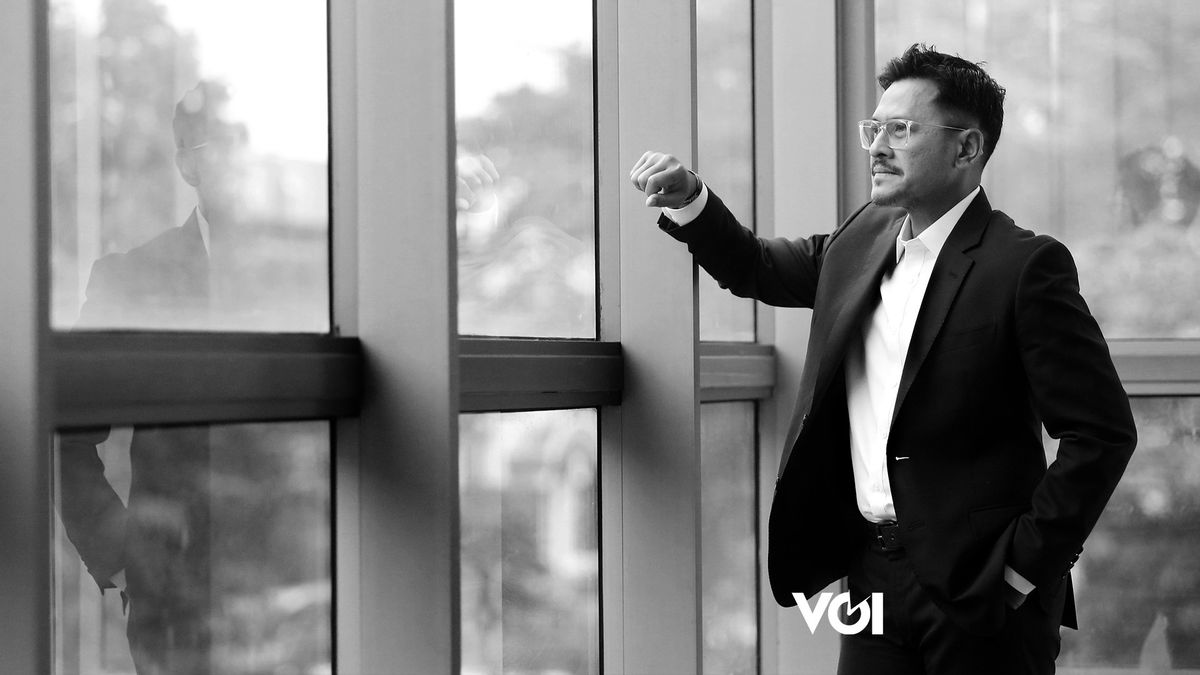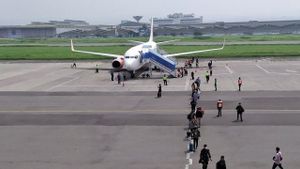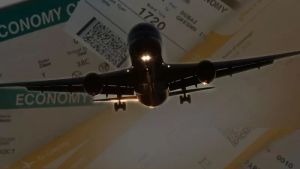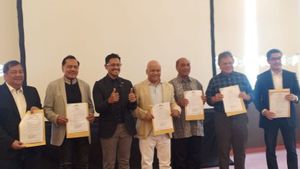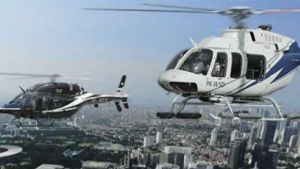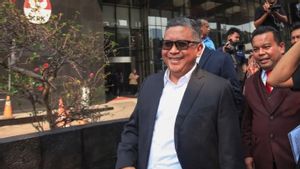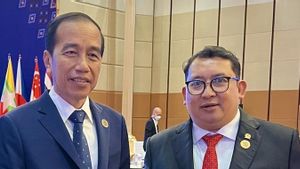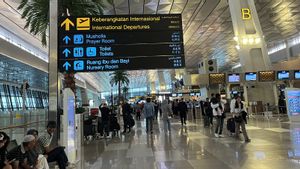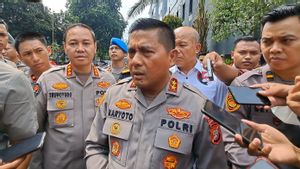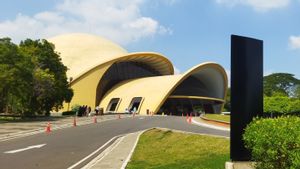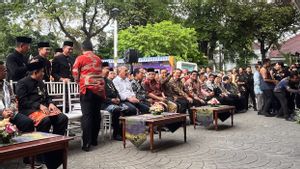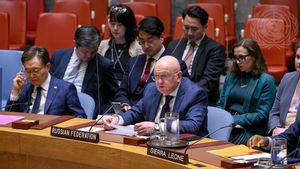With a large population spread over thousands of islands from Sabang to Merauke, Indonesia, said the Chairman of INACA (Indonesian National Air Carriers Association) Denon Prawiraatmadja, is a very promising market. However, until now, only 6 percent of Indonesia's population can enjoy this mode of air transportation.
***
When compared with other modes of transportation such as land transportation; buses and trains, and ships, air transportation is still more expensive. Because it is natural for poor people to fly by plane is still a dream. According to Denon Prawiraatmadja, currently Indonesia's population of more than 270 million, which can use air transportation modes such as planes and helicopters, is still very small. "Of our large population, only 6 percent can use air transportation," he said.
This is because to take a plane, the costs are still higher than other modes of transportation. “This means that our people's purchasing power is still weak. "With the improvement in the economy, it is hoped that the percentage of people who can use air transportation can continue to increase," he said.
In the future, the challenges that aviation industry players must overcome are decarbonization and the use of renewable energy. Therefore, gradually the percentage of use of bio avtur, which is blended fuel, must continue to increase. Because, after 2050, airlines that do not use renewable energy will be subject to a carbon tax. “This means that it will increase production costs. If it happens like this, the community will also be the one who will be burdened," he said.
Denon Prawiraatmadja said that using used cooking oil as a material that can be processed into bio avtur is one solution. Apart from that, the use of other materials as a source of EBT is still ongoing. "Apart from CPO, I heard that Pertamina is developing the use of sugar cane and corn for blended aviation fuels. "Hopefully this effort can help make our earth better," he said to Edy Suherli, Savic Rabos, and Irfan Medianto when he visited the VOI office in the Tanah Abang area, Central Jakarta, not long ago. Here's the excerpt.

Indonesia, said INACA Chairman Denon Prawiraatmadja, has a large aviation market, only 6 percent of the population can enjoy flight services. (Photo Savic Rabos, DI Raga VOI)
During the COVID-19 pandemic, the world's aviation industry is in suspended animation. Now that the situation has turned down, has the situation recovered to what it was before?
Thank God, after COVID-19 slowed down, the situation gradually improved. From the demand side, it continues to increase, approaching the level before the pandemic occurred. However, in terms of aircraft capacity that can be provided by airlines, it has not yet recovered, only around 70 percent of the capacity that could be provided before the pandemic. Based on studies conducted by INACA and Padjadjaran University, Bandung, the local aviation sector will only fully recover in 2024. Meanwhile for the international market around 2025.
If so, are the prospects for the aviation industry bright?
Indonesia is an archipelagic country, flights can be an option for business, service or holiday transportation. So the prospects are bright, especially since our domestic market is large.
What are the biggest challenges in the world of aviation in Indonesia and the world today?
There are many challenges, but if I highlight there are several; Firstly from the cost side. In terms of a market with more than 270 million people, it is a promising market. The challenge is that most of the aircraft we use are foreign products, such as those made by Boeing and Airbus, the largest. There are also other manufacturers such as Embraer, Cessna, etc. The dominance of our airline's revenues is still in rupiah, while the currency of the manufacturing country is different. This is a challenge in itself when exchange rates fluctuate. This accounts for around 30 percent of airline production costs (leasing).
In 2007 Indonesia ratified the Capetown Convention. If we ratify the agreement, when buying an aircraft the payment can be made using an operating leasing scheme. If we don't ratify, we have to pay cash. This is very conducive to our aviation industry.
What's the next challenge?
After leasing costs, there is another 30 percent challenge from aircraft fuel costs; aviation fuel. So far we have been very dependent on Pertamina for the procurement of aviation fuel, we must say thank you. Our only hope is that Pertamina can offer competitive prices. In the context of sustainable fuels with the issue of decarbonization, Pertamina must also support it.

For the future, the use of EBT (new and renewable energy) said INACA Chairman Denon Prawiraatmadja is a necessity. Airlines that do not implement EBT in 2050 will be subject to a carbon tax. (Photo Savic Rabos, DI Raga VOI)
Have aviation industry players optimized this opportunity?
In 2018, passengers at airports throughout Indonesia were recorded at 190 million/year for domestic use. Of the more than 270 airports, 35 airports are operated by Angkasa Pura. But of our large population, only 6 percent use air transportation. The question is, why are only those people using air transportation? Because the cost of taking a plane is still higher compared to other modes of transportation. This means that our people's purchasing power is still weak. So we have to rearrange the cost structure so that it is more affordable for the public. Flight operators and airport operators must sit together to create a road map to make this sector more efficient. This is a challenge that must be overcome so that the percentage of the public using air transportation increases.
The government will make our country a tourist destination. We from the aviation sector really support this effort. If the tourism sector develops, the impact will be very broad. The aviation sector will increase traffic, and various parties involved will also feel the impact. All tourism potential, from culture, nature, culinary, etc. must be developed simultaneously.
Congested urban situations, such as Jakarta, are also opportunities that are no less big, have association members optimized them?
Apart from commercial airlines (scheduled flights), there are also general aviation such as private jets and helicopters, which have under 20 passengers. In a busy and congested city like Jakarta, transportation such as helicopters, drones, and VTOL (Vertical Take of Landing) must be provided. However, the regulations must be reviewed. Like helicopters, their operating hours are only 6 am to 6 pm, they are not permitted to fly at night. Hopefully, in the near future, we can fly at night. Especially for medical purposes and during accidents, it is very important for this sector to grow. Currently, there are around 35 charter operators for helicopters, of which only 3 or 4 serve flights in Jakarta and its surroundings.
Autonomous flying vehicles will enliven Indonesia's skies, what are the opportunities and challenges? Are regulations on this matter supported by the government?
VTOL is an aviation product that is changing from mechanical to digital, from using fossil energy to using batteries. This means it continues to transform whether it will be used or not in the future. In America and Europe still require pilots in this aviation product. So it can't be purely autonomous yet.
For now, what is the market share for private jets, how many operate in Indonesia and who are the players in this sector?
For those managed by companies under INACA, there are around 35 operators. In terms of services, there are those who provide medical and VIP services. The value is great, especially for the medical sector. When patients need fast service, private jets can be an alternative.
Commercial airplane accidents still occur frequently, What are the most dominant factors in airplane accidents, and how can this be minimized?
If I'm not mistaken, data from the NTSC shows that 98 percent of the causes of accidents are human factors. Digital technology that is developing now can read and provide input, for example about components that are not functioning or some are functioning but not optimally. So the features of today's planes and helicopters are very sophisticated. Apart from that, we at the association also collaborate with aircraft manufacturers to provide training to pilots on material that was not previously anticipated.
Has the use of new technology such as artificial intelligence (AI) been implemented?
For now not yet. What is happening now is the transition from mechanical to digital and for fuel from fossil energy/aviation fuel to blended aviation fuel (bio aviation fuel).
VOIR éGALEMENT:
Until now, the Susi Air pilot has not been released, how do you see this?
We are concerned as an association, as Chairman of INACA, I express my concern. Susi Air is our member. Relevant agencies are still trying to find a solution to free the pilot who is being held hostage. Hopefully the efforts made will bear fruit.
Regarding global warming and carbon emissions being an interesting issue, how does the aviation industry implement EBT in its operations?
By 2050 all flight operators must use EBT. Which will not be subject to a carbon tax. That means increased costs for airlines and will indirectly burden society. Gradually, bio avtur must be used until 2050 actually uses EBT. So in the future the aviation industry will use sustainable aviation fuels.
Currently, what is the price of bio avtur?
This is our concern, the price of blended aviation fuels must be affordable for airlines. Otherwise, it will burden the affected communities. So decarbonization is achieved but results in high economic costs. Indonesian residents are increasingly far away from being able to enjoy air transportation.
Currently, hope lies in the use of UFO (used cooking oil) or used cooking oil collected from restaurants. Neste Singapore is currently one of the producers that produces bio-fuels and is used by various airlines.
Indonesia is the largest CPO producing country in the world, are there still problems producing bio avtur?
Economically, UFO is still cheaper than CPO. The problem is that one is material that was previously thrown away while the other is new material. Apart from CPO, I heard that Pertamina is developing the use of sugar cane, corn and also UFO for blended aviation fuels.
Cannibalism sometimes occurs in the automotive world when a component or spare part is difficult to find, does this also happen in the aviation world? If yes, how to minimize it?
Currently, of all existing spare parts, almost 49 percent fall into the prohibited and restricted category. When importing spare parts, there must be an ACC from the Ministry of Industry, Ministry of Trade and Ministry of Transportation. The problem is, for example bolts, we can make them. It's just that our bolt manufacturers don't certify them to manufacturers like Airbus or Boeing. So it cannot be used for both manufacturers. Finally, just importing the bolts took up to 3 weeks. That's why cannibalism occurs. However, as long as historical records exist, practices like this can still be tolerated.
Not Only Sports, Denon Prawiraatmadja Learned Many Things From Golf

For INACA Chairman Denon Prawiraatmadja, golf is not just a sport, he can get many things through golf. (Photo Savic Rabos, DI Raga VOI)
For the man who serves as General Chairman of INACA (Indonesia National Air Carriers Association), golf is an important activity that he does outside of his routine duties at the office. There are strong reasons why Denon Prawiraatmadja chose golf as a sport.
Apart from the benefits of exercise, he can also learn many things from playing golf. He can implement this in real life at the office and in personal activities, as well as when building relationships with his children.
“I really like playing golf. My son also has the same hobby. We play golf on the weekends," said Denon, who idolizes golfer Rory McIlroy.
For Denon, by playing with his children he can build closeness with his children. "I try to build and strengthen bonds with my children when playing golf," said Denon, who started inviting his son - Luca Adriano Prawiraatmadja - to play when he was 9 years old, and now the child is 14 years old.
There was a sense of pride when he was able to teach his own child to play golf from zero to finally being able to play together. “If I can play golf, playing with friends or relatives is normal. But when I can play with my child, it's a source of pride. That's something kids say nowadays. "This means that what I have been doing teaching and guiding him to pursue golf has had results," continued Denon, who was able to relax when he finished playing golf.
Every golf course, Denon said, is unique; there are nuances of mountains, beaches, and on the edge of town. “We just have to choose which nuance we want to experience. Towards the top you will find a field with views of the mountains. For a beach feel, you can go to the Pantai Indah Kapuk (PIK) area or to Bali and Bintan where the fields are cool. Everything has its own characteristics. But now playing golf on the weekend is a bit difficult and a waste of time. "Meanwhile, you can't play on weekdays," he said.
To my children, I emphasize that to achieve an achievement, you have to make an effort and invest time, commitment and dedication. “Without it, it is impossible to achieve dreams and achievements. I'm just opening the way, if he wants to continue as a professional golfer, go ahead," said Denon, who did not force his son to pursue something.
Golf Philosophy

Denon Prawiraatmadja is proud to be able to teach his children to play golf and now he can play golf with his children. Next, he left it up to his son whether to pursue golf professionally or not. (Photo Savic Rabos, DI Raga VOI)
After taking up golf, Denon Prawiraatmadja discovered many philosophies that can be applied to life, both in the office and in personal life. "If we take the first shot and it turns out to be wrong or far from the target, we are required not to get caught up in that failure. "Forget what has happened, look forward, focus on the next blow so we can be better," said the man who originally studied architecture but in the course of his career ended up entering and becoming successful in the world of aviation.
In his career, continued the man who was born in Jakarta on September 17, 1972, the philosophy he found on the golf course turned out to be similar. “It's the same in your career, if you make a mistake. The important thing to do is correct the mistake so that it doesn't happen in the future. "Don't let guilt dominate our thinking space for too long," he stressed.
In today's terms, it is known as moving on. “We have to think about how to improvise in the future. "That's what I experienced when playing golf, in activities at the office this pattern can also be applied," continued the Chief Executive Officer (CEO), of Whitesky Group (2010 – present).
Still in the game of golf, when you enter the bunker, said Denon, that's the time to analyze what to do next. “When we enter the bunker, we have to analyze the situation. "Are we going to defend or attack," continued Denon, who through Whitesky is now trusted to manage Halim Perdana Kusuma Airport, the only private operator that manages the airport.
“In our career or social life, it would be much better if we knew when to defend and when to attack. I apply this philosophy when working and socializing. "To my children, I also teach this golf philosophy," said Denon, who is also active in Kadin, and is believed to be the Deputy General Chair of KADIN for Transportation.
Nobody's perfect

Learning from golf, said Denon Prawiraatmadja, when you make a mistake it can be a lesson for the next shot to be better. Move on immediately and focus on the game ahead. (Photo Savic Rabos, DI Raga VOI)
In this life nothing is perfect. There are bound to be mistakes, even if you are careful, because of that, what Denon can do is minimize errors. “As an ordinary human being, what we can do is minimize mistakes. We are human, it is impossible to have zero mistakes, nobody's perfect," said Denon, who was the first to hold the third company to accept the challenge of holding Tortoise Aviation (2010).
When playing golf, we always have a target to achieve a certain number. The smaller the better. “For example, when playing 18 holes on a golf course, my target is 80. Every time I start the game, I have to refer to that number, if possible below that number. "Our effort is to try to reduce mistakes by practicing and making perfect," he said.
As believers, we, said Denon, must not forget the role of the Almighty in everything we do. “As a believer, this effort must be done seriously. We must make efforts accompanied by prayer. However, the results are a secret from Allah SWT. We leave everything to Him who is the Almighty. "But usually if we try hard and optimally, the results won't be far from that," he said.
And, continued Denon, when hard efforts have been made but the results are not as expected, we must introspect. “This means that there is another power with the will. We have to evaluate what is missing. And sometimes we don't realize there is a purpose and purpose to what God has determined for us. That's roughly what I found in the world of golf," said the man who no longer had time to pursue his old hobby, painting.
When pursuing the world of business, Denon Prawiraatmadja, who was the first to do business in the IT sector, had the principle of building the trust of consumers, shareholders, and business partners. "I learned a lot from Agus Sudwikatmono in building trust with customers and other parties," he said.
"Of our large population, only 6 percent use air transportation. The question is, why are only those people using air transportation? Because the cost of taking a plane is still higher compared to other modes of transportation. This means that our people's purchasing power is still weak,"
The English, Chinese, Japanese, Arabic, and French versions are automatically generated by the AI. So there may still be inaccuracies in translating, please always see Indonesian as our main language. (system supported by DigitalSiber.id)
